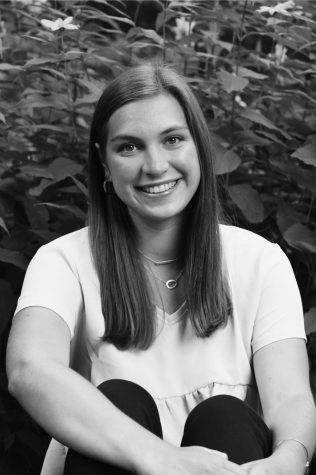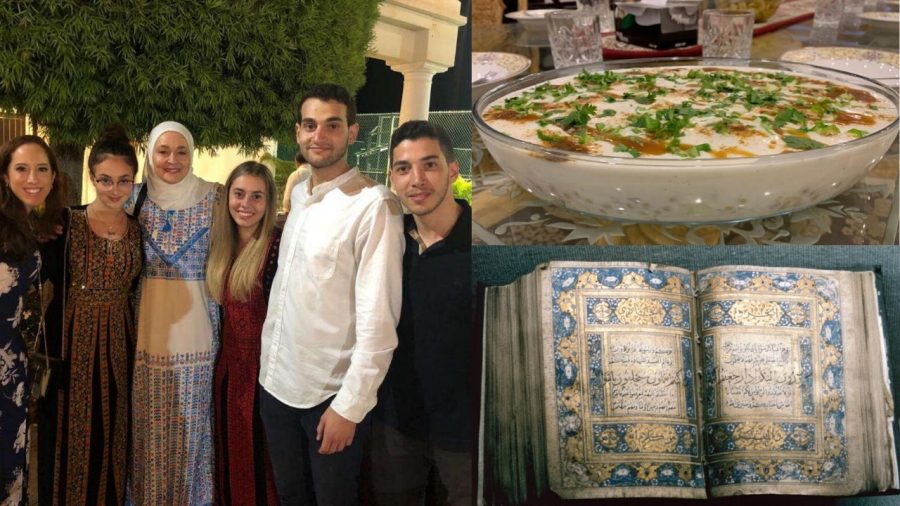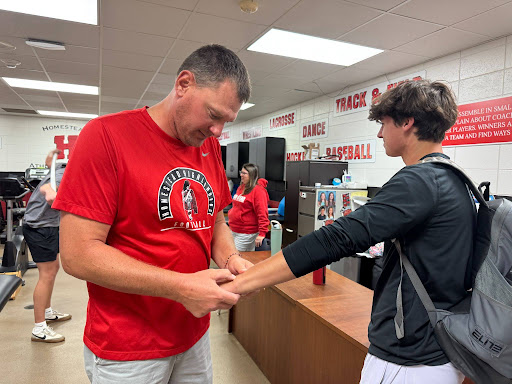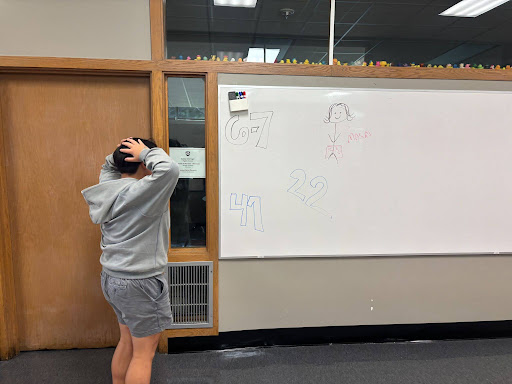How some of the Homestead community is celebrating the holy month of Ramadan
Left, Serena Said, senior,and family celebrate Ramadan together. Top right, Smeeah Haider-Shah shares a classic dish. Bottom right, the holy book of the Quran.
The holy month of Ramadan is the ninth month of the Islamic, lunar calendar and starts and ends with the appearance of a new moon. It is believed that during the last 10 days of Ramadan, the holy word of the Quran was revealed to the prophet Muhammad. This year, from April 23 to May 23, approximately 1.6 billion Muslims around the world will take part in celebrating Ramadan.
For many Muslims this month is a time of reflection and getting closer to God. Reading the Quran, communal prayer, fasting, and volunteering are just a few of the various ways to celebrate. “During this month you refrain from any vices like lying and other unlawful acts. It’s a month to really connect to God and cleanse your soul. [Ramadan] is a month about giving and compassion for others and is a time where many people go out and help the needy financially and emotionally,” Serena Said, senior, said.
An important part of Ramadan is fasting from sunrise to sunset. One of the five pillars of Islam is known as sawm. Sawm means to restrain and practice self restraint. Fasting during Ramadan not only helps to practice sawm but also creates an appreciation for what is normally taken for granted. “Fasting is an act that helps you develop understanding for the less fortunate and appreciate what is taken for granted,” Said said.
Not only does fasting involve abstaining from eating or drinking, but also from negative or impure thoughts and bad deeds. Fasting looks slightly different for all Muslim families; however, the main principles remain the same.
“A typical Ramadan day for us is waking up early in order to eat. So this year, we get up around 3 a.m., have a quick meal, followed by our first prayer of the day, then some of us will go back to sleep while others remain awake,” Mrs. Manal Roumani, computer science teacher, said. “The daytime looks similar to every other day during the year. About 30 minutes after sunset however, we perform our last set of prayers for the day, then break our fast. During this time, we usually have our spiritual discussions which could consist of reading a supplication and trying to understand what it means, or reading a verse from the Quran and learning how to apply it to our daily lives.”
Smeeah Haider-Shah, senior, has a bit of a different day. “A typical day for us is staying up till 4 a.m., which is when the sun rises. We eat breakfast, pray, and then go to sleep. When we wake up we do our normal daily routine but take out time to pray, just to give thanks to God. Towards the end of the night, before we break our fast, we start to prepare dinner together as a family. After dinner is prepared we pray, break our fast with water, pray again, and then we eat our dinner,” Haider-Shah said.
Breaking the fast is known as iftar. Dates are a common food eaten to break the fast. “When it’s time to break our fast we normally break it with a date and water. Dates can help us give us some quick energy to go pray,” Salma Presswala, sophomore, said.
“In order to break our fast we eat either a date, water or salt. To keep our body hydrated we drink lime water. This drink is highly recommended to keep your body hydrated during the day and a lot of Muslims drink this. Another family tradition we have is to eat a fruit salad. We believe after fasting the whole day we should fill our stomachs with something healthy instead of sugary, artificial stuff,” Haider-Shah said.
While fasting is an important aspect of Ramadan, spending time with family and friends, and going to Mosques to pray is equally as essential. Due to the COVID-19 pandemic this year, Muslims have turned to alternative ways to celebrate together. “Normally in the month of Ramadan at night we would go to the Mosque and everyone would pray together, and then after we would all sit down together and eat. Since the Muslim community isn’t able to physically come together, our Mosque does online Zoom or Skype calls with everyone. The leader gives speeches and others listen,” Presswala said.
Many places of worship have turned to virtual ways of communicating. For Muslims, these online methods have kept the community close during this time.“Due to the coronavirus this year, a lot of different Scholars are turning to Youtube in order to give lectures, hold panel discussions and do Q&A sessions. Admittedly, being stuck at home this year has been such a blessing during this month. It has forced us to slow down and take more time to reflect about how we have been leading our lives. All which are truly goals of this month anyways, but this year, we were given the blessing of time, though through unfortunate circumstances, more than any other year,” Roumani said.
As the month of Ramadan comes to an end it is observed as Eid al-Fitr. This is a 3-day holiday celebrated by Muslims as they complete their month of fasting and honoring Ramadan. “We pray together and then eat brunch with our friends at the Mosque. After brunch we meet up with our friends from surrounding Mosques normally at my house or my neighbor’s house for lunch. We have a BBQ, and everybody is just talking and laughing and having a good time! I always take off from school for Eid because it’s such a fun day to celebrate,” Haider-Shah said.
“On the first day, there is usually a prayer where the whole Muslim community comes together to listen to supplications, pray and then eat together. For the rest of the first day and usually the second and third day are dedicated to visiting with family and friends,” Roumani explained.
The entire month of Ramadan is a time of reflection, worshipping, giving, and spending time with loved ones. Although these uncertain times have called for alternative approaches, Muslims have found ways to continue to celebrate and worship God.

Hannah Kennedy is a senior at Homestead and serves as editor in chief of Highlander Publications. She is going to study journalism in college at the University...







Mary Avino • May 19, 2020 at 11:17 pm
I found this article on Ramadan very informative. It was interesting to learn about the varied daily lives of Muslims while they celebrate this holiday. Very well written and a unique perspective.